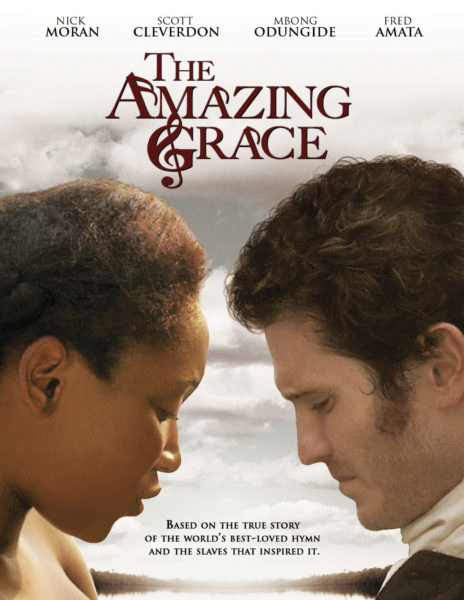Features
Rejoice Abutsa: Jeta Amata’s “Amazing Grace” Remains a Psychic Experience
 All things lose stature with time, and this quote applies to the tricky art of film making. Some films make their debut; they are received and are forgotten shortly after. Others enjoy an initial fan obsession and afterwards are touted as overrated. There are quite a few that enjoy an initial reaction, and remain appreciated years later. Appreciation comes from connection and “The Amazing Grace” by Jeta Amata scores valid points because it is art created to connect us with a necessary past.
All things lose stature with time, and this quote applies to the tricky art of film making. Some films make their debut; they are received and are forgotten shortly after. Others enjoy an initial fan obsession and afterwards are touted as overrated. There are quite a few that enjoy an initial reaction, and remain appreciated years later. Appreciation comes from connection and “The Amazing Grace” by Jeta Amata scores valid points because it is art created to connect us with a necessary past.
Over a decade ago, Jeta Amata, created a remarkable piece of cinema with The Amazing Grace, a film that contributed to the loss of his house and incurred the filmmaker a few debts. The film sits comfortably as one of Nollywood’s most memorable films – for its thematic expression and the importance of this expression in the present day. Among many other qualities of the film, The Amazing Grace is visually enticing, and that unforgettable Joke Silva voice-over is a reason to see the film again.
The Amazing Grace is the reformation story of British slave trader John Newton. It focuses on the arrival of John’s voyage to Nigeria to buy slaves, the events that inspired him to write one of the greatest hymns of all time, and later become an Anglican priest. The film separates the culture that existed before and after the visitation of John, and also focuses on the effects of the disguised visitation. With promises of a better life, came slave trade.
“The Amazing Grace” was created to counter many of the films that existed and projected the experience of the slave masters and not the slaves, and also, to tell of a filtered culture. One of the greatest and most recorded moments in gospel history also serves as inspiration for the film.
The most important aspect of Jeta’s style is the use of cinematic symbolism to admonish his viewers. He suggests with his writing that our cultural insecurity allowed slave trade, but most importantly, through his writing, he blames Nigerians for Nigeria’s problem! This does not sound fair but there is a lot to learn from his writing, especially considering our present narrative as Nigerians.
The Amazing Grace digs deep into the themes of exploitation, which is also the main agenda of the film. We cannot resist exploitation if we lack the tools to fight exploitation, but in the events of The Amazing Grace, there was the powerful tool of culture to fight exploitation. Unfortunately, the people realized too late. The understanding of place — uniformity, is what Jeta insists could have saved Nigeria from slave trade. The slave masters couldn’t survive without collaboration; they got collaboration from the people and used it aggressively. The writing is humbling, when the perspective of how a ship and its massive appearance played a part in influencing subservience, or when Jeta writes of the ship wreck and the weakness of the slave masters after this, indicating the power that the slaves didn’t know they had, until the ruin was too deep. The importance of loyalty and trust comes to play. The trickiness of dominant culture and how we permit its dominance over us, the acceptance of conformity and the loss of an original culture are themes that remain central to the making of The Amazing Grace.
The film explores faith, too. Natural occurrences and an experience of the brutality of slave trade convert John Newton. A few interesting examples on how the invasion of the slave masters affected the people – a ship (called The Grey Hound) arrives the creeks of a remote town, old Calabar, it was an exciting arrival because, “She looked like an enormous house built upon a river, and so did her dwellers… she sat majestically on our waters”, this description comes from Ekanem (the narrator) and this arrival plays a part in the success of slave trade. The ship was not only enormous; the people in it walked into the town and invaded it majestically. The slave traders had a different kind of organization and presentation and it is why they were accepted by the people. They used families against each other, swapped the people’s culture, modified what they got from the people and sold it back to them.
The narrator speaks of her own past and how she had to stop bearing her native name Ekanem, she had to adopt Mariah Davis. How her native tongue was replaced with English; of how a culture that defined them became barbaric. This sort of swap continues to happen in the present day. It is highly reflective of our modern day society. English has become a dominant and standard measure of knowledge in Nigeria, and to represent our own culture is to be local, this constitutes a major problem in the film. To have a culture is to have a weapon. Nothing defines a people more than their culture, and once this is lost they become a copy.
People with lost identity are all that is left after The Amazing Grace. The sanctity of the film, and the message embroiled in Jeta’s writing and how this is communicated to the audience is what makes the film a masterpiece.
Eleven years ago, Jeta was concerned about cultural originality. He used film to push for self-acceptance and condemned insecurity as the cause of our problems as human beings. He used film to push for love, and at the same time balance. He pushed for independence as well as inspiration. The story in The Amazing Grace covers an event that happened over 100 years ago, but the problems that existed in that society, still exist in our society.




















